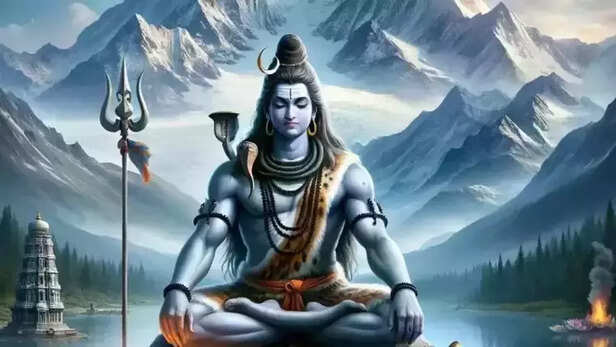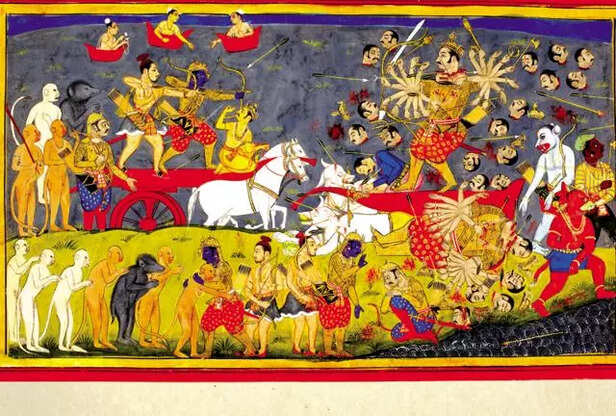Why Did Rama, the Righteous King, Seek Shiva’s Forgiveness After Ravana’s Death?
Nidhi | Jan 25, 2025, 09:21 IST
Ramayana
Lord Rama, known as the embodiment of dharma and righteousness, prayed to Lord Shiva after defeating Ravana—a gesture rooted in humility and spiritual understanding. Despite Ravana's wrongdoings, Rama recognized the profound responsibility of taking a life, even in the pursuit of justice. This act of seeking forgiveness at the sacred Ramanathaswamy Temple in Rameswaram symbolizes Rama’s acknowledgment of divine law, the importance of humility, and the eternal cosmic balance. This article delves into the reasons behind Rama’s prayer, the role of Shiva’s blessings, and the spiritual significance of this timeless story.
"Even the purest souls can be burdened by the weight of their actions—no matter how righteous they may seem."This is the essence of the profound moment in the Ramayana when Lord Rama, after the victory over Ravana, turns to Lord Shiva and seeks forgiveness. But why would the embodiment of righteousness, the man who defeated the demon king to restore dharma, feel the need to ask for mercy? After all, Ravana was the villain, the one who abducted his wife and wreaked havoc on the world. So, what compelled Lord Rama to pray for forgiveness after ending Ravana’s life?
Let’s unravel this spiritual moment and understand the hidden layers of emotion and humility behind Rama’s prayer, revealing not only the complexities of duty but also the timeless wisdom embedded in the Ramayana.


Rama’s prayer to Lord Shiva after Ravana’s death teaches us a profound spiritual lesson. It shows that even the most righteous actions can carry a weight, and true strength lies in seeking divine guidance. Rama, as the ideal king, understood that the essence of dharma is not just in performing righteous actions but also in humbling oneself before the divine.
In seeking Shiva’s forgiveness, Rama was not just acknowledging the consequences of war, but reaffirming his unwavering devotion to the cosmic order. His prayer in Rameswaram is a testament to the deep humility, wisdom, and spiritual maturity that defined his character. This moment highlights that no matter how victorious or righteous we may be, the path to true purity and enlightenment lies in our ability to surrender to divine grace and seek forgiveness when necessary.
Rama’s journey, both as a king and as a devotee, teaches us that victory without humility is hollow. His prayer to Shiva symbolizes the eternal truth that the divine forces guide and govern all our actions, and that the essence of righteousness lies in recognizing the importance of seeking forgiveness, no matter how righteous we are.
Let’s unravel this spiritual moment and understand the hidden layers of emotion and humility behind Rama’s prayer, revealing not only the complexities of duty but also the timeless wisdom embedded in the Ramayana.
1. Rama’s Struggle with the Weight of His Duty
- A King Torn Between Duty and Compassion: Lord Rama was the ideal king, the embodiment of dharma. But even he, bound by his sense of righteousness, could not escape the emotional weight of his actions. Though Ravana was undoubtedly a tyrant, the act of taking a life—even one as evil as Ravana's—was not something Rama could take lightly.
- The Internal Conflict: As a warrior, Rama was bound by duty to protect dharma. However, as a human being, he felt the sorrow of taking another life, even for the greater good. This conflict—duty versus compassion—was a deep emotional struggle for Rama. It is this internal battle that led him to seek forgiveness from Lord Shiva.
- Acknowledging the Complexity of War: Rama understood that even in fulfilling his role as a protector of dharma, he was still a part of the larger cosmic play. In his heart, he knew that war and violence, even for a just cause, bring about consequences. By praying for forgiveness, Rama acknowledged this truth.
2. The Power of Forgiveness and Humility
- Seeking Mercy, Not Guilt: Rama did not seek forgiveness because he felt guilty for defeating Ravana. Rather, his prayer was an act of humility. He sought divine blessings from Lord Shiva to ensure that his victory was in alignment with cosmic law. It was a spiritual act of surrender, recognizing that even righteous actions need the grace of the divine.
- A Lesson in Humility: Rama, despite his greatness, showed us that even the most virtuous souls must remain humble before the divine. He did not allow his victory to cloud his humility. Instead, he humbled himself before Lord Shiva, understanding that true strength lies not in pride, but in surrender to divine will.
- Rama’s Deep Devotion: Rama's relationship with Lord Shiva was based on deep devotion. By praying to Shiva, he was reaffirming his faith in the divine forces that govern life. He acknowledged that, as much as he was the hero of the epic, it was only through divine guidance that his actions were righteous.
3. The Sacred Ritual at Ramanathaswamy Temple, Rameswaram
- The Pilgrimage to Rameswaram: After Ravana’s defeat, Rama traveled to Rameswaram to seek spiritual solace. It was here, at the sacred Ramanathaswamy Temple, that he prayed to Lord Shiva for forgiveness. This temple, dedicated to Lord Shiva, is one of the most sacred places in India, and its connection to Rama’s journey adds a powerful layer of significance.
- Rama’s Prayer for Purification: At Rameswaram, Rama performed a ritual to cleanse himself of any sin or impurity caused by the killing of Ravana. Though Ravana’s death was necessary for restoring dharma, Rama still sought spiritual purification. This act of seeking forgiveness wasn’t out of guilt but out of the realization that no victory, no matter how righteous, should be achieved without divine intervention.
- The Ritual of the Rama-Sethu: The temple is also closely tied to the Rama-Sethu (the bridge), which Rama built to cross the ocean to Lanka. The act of praying here was more than a spiritual cleanse—it was a reaffirmation of his devotion to Lord Shiva and his acknowledgment of divine mercy in his actions.

Lord Shiva
- Shiva as the Source of Mercy: Lord Shiva is known as the god of mercy and destruction, who is free from ego and judgment. By seeking forgiveness from Shiva, Rama was demonstrating that he, too, recognized the importance of divine grace. Shiva, in his infinite wisdom, represents the balance of destruction and creation, making him the ideal deity to pray to after the battle.
- A Cosmic Balance: The moment of Rama’s prayer highlights an important spiritual lesson—righteousness and justice are not only about the physical world but also about maintaining cosmic balance. Even the most righteous king needs to seek balance with the divine forces that govern the universe. Rama’s prayer was a reminder that no act, even in the service of dharma, should be carried out without seeking divine guidance.
- The Divine Understanding of Action: Rama’s prayer was an acknowledgment that every action has repercussions, even when done with the purest of intentions. His seeking forgiveness was a way to ensure that his actions were in alignment with higher cosmic principles, not just his own interpretation of dharma.

Ramayana
- Rameswaram: A Place of Divine Connection: Rameswaram is not just a geographical location, but a place of spiritual significance. According to tradition, it is where Rama sought the blessings of Lord Shiva before embarking on his war against Ravana. The temple is a symbol of the connection between Rama and Shiva, showcasing how spiritual journeys are intertwined with the land.
- The Sacred Nature of the Temple: The Ramanathaswamy Temple in Rameswaram is one of the twelve Jyotirlingas of Lord Shiva, making it a powerful site of worship and spiritual cleansing. It is here that Rama symbolized his humility and devotion, reinforcing the idea that divine grace is essential for maintaining righteousness.
- Rameswaram’s Symbolism: The temple also represents the place where Rama sought redemption for the burden of war. It is here that he was reminded of the higher cosmic laws that govern all actions and their consequences. For Rama, Rameswaram was a sacred space to reconnect with the divine and ensure his actions were aligned with the greater good.
The Spiritual Journey of Rama
In seeking Shiva’s forgiveness, Rama was not just acknowledging the consequences of war, but reaffirming his unwavering devotion to the cosmic order. His prayer in Rameswaram is a testament to the deep humility, wisdom, and spiritual maturity that defined his character. This moment highlights that no matter how victorious or righteous we may be, the path to true purity and enlightenment lies in our ability to surrender to divine grace and seek forgiveness when necessary.
Rama’s journey, both as a king and as a devotee, teaches us that victory without humility is hollow. His prayer to Shiva symbolizes the eternal truth that the divine forces guide and govern all our actions, and that the essence of righteousness lies in recognizing the importance of seeking forgiveness, no matter how righteous we are.
